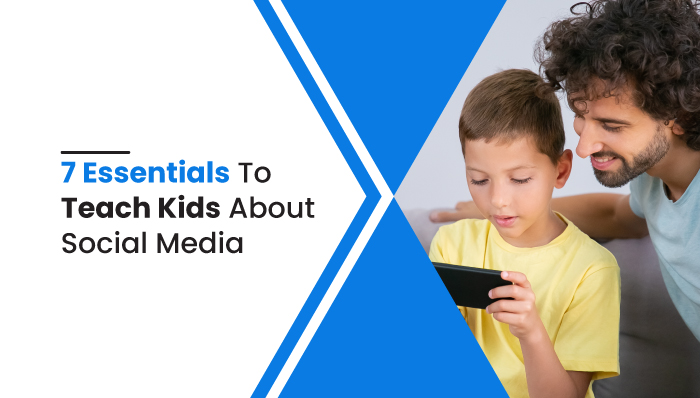7 Essentials To Teach Your Kids About Social Media

7 Essentials To Teach Your Kids About Social Media
Social media has become part of our kids’ life. So, read this blog to learn about the 7 essentials to teach your kids about social media.
 In today’s digital world, social media and the internet have become an essential part of our everyday life. Because of the easy access to the internet, most people use social media and have profiles on social networking sites, including kids. And most of the kids visit social media platforms daily.
In today’s digital world, social media and the internet have become an essential part of our everyday life. Because of the easy access to the internet, most people use social media and have profiles on social networking sites, including kids. And most of the kids visit social media platforms daily.
Social media offers a lot of benefits; it allows us to communicate with our friends and relatives. Here, users can easily share their views, ideas, and experiences. According to a Pew Research Center survey, 90 percent of teenagers use social media, and 45 percent said they are almost always online.
Though social media interaction may seem harmless, your kids might unintentionally be exposed to predators and stalkers. So, it is essential to teach some basic internet safety rules to ensure that kids are safe while using social media.
Benefits of social media for kids
Despite its numerous drawbacks, social media may provide an excellent opportunity for children to acquire their skills. Some of the benefits of using social media include:
 Digital media literacy: With the help of social media, your kids can explore and experiment with the new information to develop their skills.
Digital media literacy: With the help of social media, your kids can explore and experiment with the new information to develop their skills.
- Collaborative learning: Social media lets kids meet new friends who share the same interests. They can also exchange instructional information.
- Enhance creativity: Your kids may express themselves through personal pages, photographs and video, and game changes.
- Mental wellbeing: Connecting with extended family and friends, as well as participating in local and worldwide online communities, may provide your child a feeling of belonging and connection.
Risk of using social media
Social media may often be dangerous for kids. It has become the primary choice for predators to target young kids. Some of the risks include:
- Inappropriate content: Most kids may be exposed to explicit content like abusive language, violent or sexual images. Kids might get addicted to these things.
- Online predators: Your kids might share personal information with strangers, for example, home addresses, phone numbers. Predators and scammers can trick your kids into sharing credit card details which can be harmful.
- Cyberbullying: It is becoming a severe problem on social media. Strangers can harass your kid or comment bad things on their photos regarding their body and appearance. Cyberbullying can hurt their mental health.
- Social media addiction: Most kids spend hours watching videos and photos, content posted by their followers. If your child is addicted to social media, it may interfere with their everyday activities such as school, sports, and other productive activities.
7 essentials that you should teach your kids while using social media
Now that we have weighed the pros the cons of social media let’s learn how you can help your have safe and better kids’ experience whilst using different social media platforms. So, here I have mentioned 7 essentials that you should teach your kids while using social media:
-
Set strong password
Selecting simple passwords seems easy for your kids to remember. But when it comes to online accounts, it is more important to choose a unique password to prevent hackers from accessing your kid’s accounts. In addition, you can also set two-factor authentication for your kid’s account to increase the level of security.
-
Think about the age restriction
Most social media sites like Instagram, Facebook, Snapchat, and Twitter require their user to be at least 13 years old while signing up. Though kids under 13 are not allowed to use social media sites, many children can lie about their age as they do not verify the user’s age. Many children use their parents’ email addresses and lie about their age to create accounts. So make sure that they understand the age restriction on social media sites and monitor their activities.
-
Beware of predators
Connecting with new people through social media is common these days. But some people create fake stories to stalk and target young kids. So it would help if you told your kids that they should not accept friend requests from strangers and share personal information like home address, phone number, and where they study.
Predators can use these details against them. Many social media platforms have a check-in option, and if your kids have a habit of sharing the specific location of events or new places they visit, then predators might follow around.
-
Report inappropriate activity and users
Many social media sites contain inappropriate content, and some of them may use abusive language. If your kid ever encounters such activities, then tell them to report users and such content.
Experts say that 2 out of 10 kids are being harassed online. Some of them might blackmail your kid using their photos and videos, manipulate them to do illegal activities. Make sure that your kid reports such users.
-
Keep your social media profile private.
Social media platforms provide a wide range of privacy settings options. You can change your kid’s profile to private so that only people who are friends with your kids can see the content they share.
Most kids on Instagram prefer to keep their profile public to increase the number of followers. Please remind your children that having a public profile makes it simple for predators to stalk you. They can use their identity to create another fake profile and engage in inappropriate activities.
Read More: How to lock a facebook profile?
-
Cyberbullying
Cyberbullying is becoming a significant concern on social media these days. It includes leaving mean comments on photos and videos, humiliating others by posting embarrassing photos.
Unfortunately, some kids do not speak out or report it, harming and lowering their self-esteem. So, as part of your daily communication, try to talk with them about cyberbullying and ask them to report such users.
-
Limit screen time
Screen time limiting is necessary for kids as well as parents because kids learn from what they observe. Kids these days are hooked on social media; they have a habit of sharing everything they do.
You can set clear rules and time limits about when your kids can use social media. Setting time limits will help your child develop healthy habits and avoid spending a lot of time on social media.
Conclusion
Raising children in this digital world can be challenging if parents are unfamiliar with social media. Social media may benefit children to some extent, but you should not underestimate the risk that comes along. So, I hope the essentials listed above will help you teach your kid to use social media responsibly.



 WhatsApp Spy
WhatsApp Spy Facebook & Messenger Spy
Facebook & Messenger Spy Viber Spy
Viber Spy Instagram Spy
Instagram Spy Skype Spy
Skype Spy TikTok Spy
TikTok Spy Telegram Spy
Telegram Spy LinkedIn Spy
LinkedIn Spy Twitter Spy
Twitter Spy Youtube Spy
Youtube Spy Photo Spy
Photo Spy Video Spy
Video Spy Calls and Contacts Tracking
Calls and Contacts Tracking SMS & IM Chats
SMS & IM Chats Voice Capture
Voice Capture Image Capture
Image Capture Video Record
Video Record